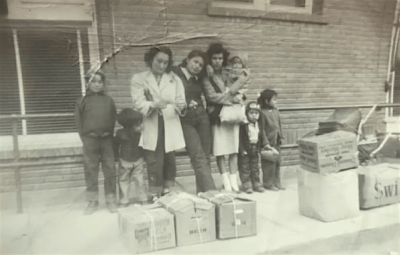1378 Growing up on Salmon River
All the Quiet Places
by Brian Thomas Isaac
Victoria: TouchWood Editions, 2021
$22.00 / 9781990071027
Reviewed by Danial Neil
*
 In his debut novel, Brian Thomas Isaac invites us to bear witness to the life of Eddie Toma. He deftly guides us, shocks us, and in the end informs us of the reality of growing up Indigenous in the fifties and sixties. Here we open our minds and our hearts as we meet young Eddie as he explores his world on the reserve along British Columbia’s Salmon River. The simple map inside the book illustrates the physical scope of the story: Eddie’s house, the outhouse, hollow tree, Grandma’s house, the river and the highway, and the Cluff farm across the river dominate, but the emotional scope is vast. Eddie is an observer of everything. He takes the same keen interest in his family, his mother Grace and younger brother Lewis, and his Grandmother and Uncle Alphonse, as he does the world outside his door. The trees along the river, his secret place under a cottonwood stump, and the river itself function as the backdrop to his young life, providing a steady and unfailing presence that sustain him.
In his debut novel, Brian Thomas Isaac invites us to bear witness to the life of Eddie Toma. He deftly guides us, shocks us, and in the end informs us of the reality of growing up Indigenous in the fifties and sixties. Here we open our minds and our hearts as we meet young Eddie as he explores his world on the reserve along British Columbia’s Salmon River. The simple map inside the book illustrates the physical scope of the story: Eddie’s house, the outhouse, hollow tree, Grandma’s house, the river and the highway, and the Cluff farm across the river dominate, but the emotional scope is vast. Eddie is an observer of everything. He takes the same keen interest in his family, his mother Grace and younger brother Lewis, and his Grandmother and Uncle Alphonse, as he does the world outside his door. The trees along the river, his secret place under a cottonwood stump, and the river itself function as the backdrop to his young life, providing a steady and unfailing presence that sustain him.
The book begins the morning after a summer storm raged down upon their poor house. Eddie looks out the window. Trees are down everywhere. He finds his mother at the table. Grace sits with a cigarette, and we are introduced to her mood. Eddie tries to understand. He worries when she’s distracted, “red-eyed” as if daydreaming. “He felt sad and wondered what he could do to make her feel better.” This theme, along with his mother’s shortcomings and the lengths she goes to rise above the poverty of reserve life, serve as the driving force, the device of Eddie’s coming of age.

As the story develops, we see the care that Isaac takes with Eddie as he navigates his young life. There is a wildness, the innocence of a boy at play, a kind of balance of the exterior wonders of the woods with the hard and unforgiving interior of the house, a house without plumbing or electricity. This contrast of wonderment and oppression is used skillfully throughout the story. Isaac’s story-making feels understated at times, a kind of relief, but one still feels the accumulating weight, the gathering storm. And when Grace’s old friends Ray and Isabel arrive with their son Gregory, we feel at once the impact of a man in the house. Grace is ambivalent with Ray’s arrival. His flamboyant charm and gifts accompany a plan to lift Grace and her family out of poverty, starting by picking field crops in the farms of Washington State for the summer. He convinces Grace that the Indian Agent will take Eddie away to a Residential School once he sees the living conditions on the reserve. As she wishes that Eddie will attend the white school in Falkland, she agrees.
The story shifts to the farm cabins in Washington, where a malignancy seeps into the story. We bear witness to Ray’s alcohol abuse after hard days in the field that soon turns into violence. Gregory runs away after he is beaten with a willow stick for stealing a candy sucker at the local store. Eddie fears that Gregory will get another switching. The search is on, only to find Gregory dead. The story pauses here, perhaps to reflect, to comprehend what has happened, how life can be irrevocably changed, ended. And soon Ray and Isabel leave.

At such times in the story there is evidence of some trick at play. The third person narrative seems to drift into first person. We get closer to Eddie, can hear his beating heart, feel his fear, feel his grief for his new friend. A device of the author perhaps, or simply the effect of the reader’s profound sympathy for Eddie and his experiences.
Isaac’s simple but convincing writing style moves effortlessly, poignantly, from character to character and scene to scene that includes, purposefully, the ever-present landscapes along the Salmon River, the highway and highway bridge. All are foundational fixtures. All the Quiet Places feels partly autobiographical, by the way, and not so astoundingly; the writer and the written cannot be separated completely. Isaac’s soul is stitched to every page, paragraph and word, but hidden from the reader. The craft in fiction is to conceal oneself, an illusion really. But his personal experience cannot be challenged, or mitigated for any reason. We must hear the clear truth of anything, but particularly that which reveals the consequence of colonial subjugation. To read is to listen, and to listen is to understand.
Summer is over and starting school for the first time can be traumatizing to be sure, crossing the highway bridge over the river to catch the school bus, for starters. And Eddie soon discovers that there are other complications, not from his own making, but because he is an Indigenous boy in a white school where racism thrives unanswered. He musters his will to survive the taunts and bullying. There is one particular boy who is relentless with his intimidation: Rodney Bell. But Eddie meets this challenge with his own self-protection and toughness, a strategy that results with visits to the principal’s office where he is strapped for his crimes. Not quite the deterrent, for the day will come when Eddie challenges Rodney to a fight to the end. But one bright light at the school, a new friend, a spirited white girl named Eva Cluff, unexpectedly steals young Eddie’s heart. They become fast friends, and gives Eddie a sense of hope.
And yet hope can be taken away, a hard lesson to learn for a young boy, and that is precisely what happens when Eddie’s father, Jimmy, whom has never met, shows up on day at the house. He recognizes some unfinished business between Jimmy and his mother. He brings Eddie and Lewis gifts. A bag of marbles for Lewis, but to Eddie, he gives him his childhood .22 rifle. There is the promise of a better life, but once again Eddie is let down by an adult male as Jimmy’s drinking and violence spiral. These are hard pages in All the Quiet Places, but Isaac assuages us with innocent moments in the story that are necessary in their simplicity. For example, when Eddie goes fishing with his grandmother along the river. She serves as a solid foundation, something absent in his life at home. They dig for worms and go on to catch several pan-sized trout. “You know Eddie, school starts pretty soon … I won’t hardly see you anymore. You’re the only pardner I got left….” Heartfelt moments that serve as a sort of compress for emotional wounds.

On one particular time Jimmy and Eddie go into Vernon. Jimmy has business to attend to, mainly in the beer parlour with another woman. But Eddie is not idle. Fourteen now, he finds his way around the town, visits pool halls and walks down the main street. Sometimes he just watches the street. He is about go into a cafe and notices Eva Cluff with her girlfriends across the street:
To Eddie’s surprise, she threw her arms around him and hugged him. She held him for so long that people walking by stared at them. Eddie placed his hand on her beck and was about to return the hug when she pulled away. She reached out and cupped his face with her hands. Eddie didn’t know what to think. He had always liked Eva — a lot — and dreamed of them being together, kissing and looking into each other’s eyes like people in the movies. He couldn’t believe what was happening.
She tells Eddie that she will soon be returning to UBC, and invites him to their apartment. Of course, with his raging hormones, he accepts. There, he manages to take Eva’s yellow kerchief and stick it in his pocket. Eva, with her white privilege, is crucial to the continued unfolding of the story, a key figure in Eddie’s emotional development. There is a moment later in the story when Eddie assumes Eva feels the same as he does, and kisses her on the lips. She is upset: “… I’m so disappointed that you’re just like all the other boys after all.” Eddie doesn’t understand what has happened.
The visceral moments continue, a kind of quickening to the story now. Jimmy’s presence in the house grows continually worse, abusive physically and emotionally. Eddie grows bolder to protect his mother. In one particularly violent episode, Jimmy punches the pregnant Grace in the stomach. Eddie has thoughts of beating Jimmy to death with a club. Jimmy leaves for good and Grace loses the baby. And so, Isaac begins to conclude the story, helps us make sense out of a boy’s life. Eddie meets Rodney Bell in a fight, a fight to settle all scores, and Eddie rises bloody and victorious. Rodney Bell won’t touch him ever again. His grandmother dies. Life is hard, never lets up. Eva invites Eddie to lunch with her unexpecting parents and uncle. She has made up to Eddie, apologizing for her earlier rebuff. But her parents’ unbridled racist insults are too much to take, and Eddie leaves. It is an awful moment. Eddie only wishes to be accepted. Eva follows after Eddie on her brother Albert’s horse. She calls out to Eddie. He crosses the bridge. A truck is coming and….

So, we see the string of tragedies that Isaac knits into his narrative. I found the tragedies somewhat restrained, perhaps to give a sense of normality: not to astonish, not to shock the masses, but to elucidate life as it was and still is on many reserves. This skilful rendering of the story offers a few doubling-over punches to the gut, but there is the steady gnawing in the belly as the string stretches across time until the cumulative affect leaves you dazed. All the Quiet Places is superb story-making, nuanced in ways that only Isaac can provide. Isaac knows this story, knows how it has played out over generations now. I thank him for his honesty and his craft. This is a first novel, after all, and one that is so needed. It leaves a promise of more to come from a true story-teller.
*

Danial Neil was born in New Westminster in 1954 and grew up in North Delta. He began writing in his teens, journaling and writing poetry. He made a decision to be a writer in 1986 and took his first creative writing course in Langley with Rhody Lake. Danial worked steadily at his craft, completing eight unpublished novels. And then one of his short stories was published in the 2003 Federation of BC Writers anthology edited by Susan Musgrave. He went on to participate in the Write Stretch Program with the Federation of BC Writers teaching free verse poetry to children. He won the poetry prize at the Surrey International Writers’ Conference four times and studied Creative Writing at UBC. His poetry and fiction articulate a close relationship with the land, its felt presence in his narrative and vision. He is the author of The Killing Jars (Trafford, 2006), Flight of the Dragonfly (Borealis/Tecumseh, 2009), The Trees of Calan Gray (Oolichan, 2015), my June (Ronsdale 2014), Dominion of Mercy (NeWest Press, 2021), The Sum of One Man’s Pleasure (NeWest Press, forthcoming 2024), and contributor to the poetry anthology Worth More Standing (Caitlin Press, Spring 2022). Danial lives on Vancouver Island.
*
The British Columbia Review
Publisher and Editor: Richard Mackie
Formerly The Ormsby Review, The British Columbia Review is an on-line journal service for in-depth coverage of BC books and writers. The Advisory Board consists of Jean Barman, Wade Davis, Robin Fisher, Cole Harris, Hugh Johnston, Kathy Mezei, Patricia Roy, Maria Tippett, and Graeme Wynn. Provincial Government Patron (since September 2018): Creative BC. Honorary Patron: Yosef Wosk. Scholarly Patron: SFU Graduate Liberal Studies.
“Only connect.” – E.M. Forster
2 comments on “1378 Growing up on Salmon River”